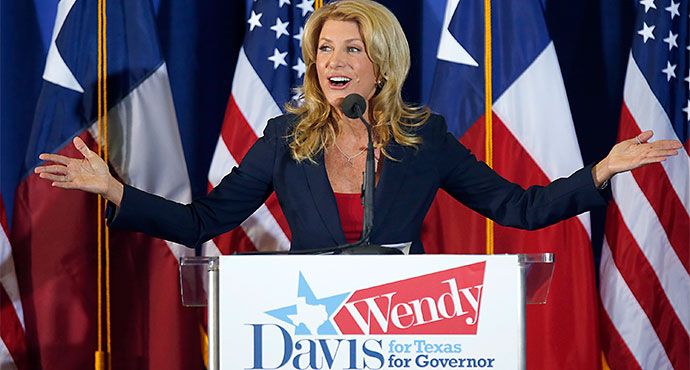An article titled “The Legend of Wendy Davis” will appear in the New York Times Sunday Magazine this weekend. Unfortunately, the web version of Robert Draper’s story, which is live now, is called “Can Wendy Davis Have It All?” The silly online headline weakens the power of an otherwise compelling profile of a politician on the rise.
No, Wendy Davis can’t have it all. No woman (or man for that matter) can. And such questions are only directed at women–a point that the article illustrates well. If a Wendell, rather than a Wendy, were running for governor of Texas no reporters or opponents would be asking where his children were while he attended Harvard Law School or just how much of his success he could take credit for given that his spouse helped pay college and law school bills.
Instead of the ridiculous question of can she have it all, some better queries are:
- How did Wendy Davis manage to foster a challenging, fulfilling public service career, while raising two now-adult daughters, who praise her as an exemplary mom?
- Why did she open herself up to character attacks by leading with a single-mom-up-from-the-trailer-park narrative?
- Can the tough-as-nails Democrat win over conservative voters if she’s candid about the details of her life choices, such as leaving her children in Texas while attending law school at Harvard?
Draper does a good job of exploring the latter two questions. He suggests that straightforward political calculations fueled her campaign’s decision to position her as a single mom who overcame great odds to get an education and improve her station in life. Apparently Team Wendy suspects that her economic development successes in Fort Worth and her legendary 11-hour filibuster that stalled passage of a Texas legislature anti-abortion bill simply are unlikely to galvanize enough voters. But her personal story combined with a unifying (if generic) “Great Schools, Great Texas” platform just might resonate more powerfully with the young people, soccer moms and minorities she must woo to win.
We’ll have months to watch this know-like-trust campaign strategy unfold and see just how effective it proves. But I doubt we’ll soon see a full account of the personal decisions and tradeoffs Davis made in her pursuit of a demanding public service career. The nitty gritty details of the ambitious mother’s childcare arrangements and parenting style would no doubt unleash a harsh, reflexive storm of public judgments that no campaign would court. Just look at the vitriol that onlookers have already spewed at her for getting an out-of-state graduate degree.
That’s too bad, because what the next generation of women leaders in every field needs to hear most is that it’s okay to make tough calls. That “balance” is an illusion, but aligning your work (at home and in the world) with your values is not. That the quality of the care and concern that you give your children isn’t measured in hours spent side by side. That there are a number of ways to be a great mom. That getting an education and making a demonstrable, unassailable positive difference in your city and state can be a valuable part of the work of motherhood too.
I hope Davis is wrong to believe that voters embrace supermom myths more readily than real policy achievements. But if the persistence of illusions about having it all and unrealistic expectations of women and mothers are any indication, she isn’t.


